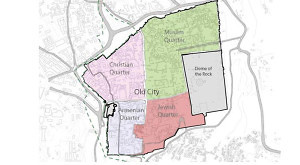 Three former Canadian diplomats with extensive experience in the Middle East have spent six years developing a formula for the passionately contested final status of Jerusalem’s Old City, and on July 13, they came to IPI to present their findings.
Three former Canadian diplomats with extensive experience in the Middle East have spent six years developing a formula for the passionately contested final status of Jerusalem’s Old City, and on July 13, they came to IPI to present their findings.
The three, Michael Bell, Michael J. Molloy and John Bell, developed the project at the University of Windsor in Ontario and they circulated a 131-page booklet outlining in great detail their proposal, which is known as The Jerusalem Old City Project.
Their study departs from the traditionally heavy focus on sovereignty and explores instead a special regime for Jerusalem whereby governance of the Old City would be overseen a joint body of Israelis and Palestinians and managed by a third party commissioner appointed by the two countries. By definition, it could come into effect only after the adoption of a two-state solution.
Speaking before a projected map of the Old City, each of the three authors talked about the sensitivities of working in the context of competing historical claims to the Old City and the challenge of producing a formula which might gain the support of both Israelis and Palestinians.
Michael J. Molloy: “Our proposal starts out with the idea that the special regime has to come out of the treaty between the two peoples. It can’t be imposed from the outside. It can’t be dropped in by the U.N. or anybody else. It’s gotta’ be organic to their peace process.”
John Bell: “We don’t say a lot about sovereignty and that’s intentional. Our own view, debatable, is that our proposal is sovereignty-neutral, meaning it could be applied under a situation of divided sovereignty of the Old City, deferred sovereignty or no agreement whatsoever. That’s our view. Others have debated us on this. They say that what we’re proposing does have implications and in that sense, very frankly, considering this special regime may not be the first choice of either Israelis or Palestinians. It could be a good fallback should sovereignty prove to be a massively difficult issue as it was in 2000.”
Michael Bell: “It is the holy site for Jews, and nothing’s going to change that just as it is a holy site – a very important holy site for Muslims, and nothing’s going to change that belief, which is deeply embedded in the cultural, social, historic, geopolitical and mystical consciousness of both parties.”
The discussion was moderated by Warren Hoge, IPI’s Vice President for External Relations.







